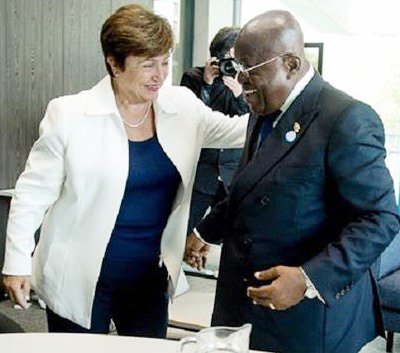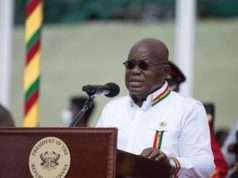The International Monetary Fund (IMF) has given Ghana’s economic recovery a thumbs up following positive indicators in the inflation rate, economic growth and debt restructuring processes.
“Your growth is better than expected, your inflation is lower than expected, the progress in debt restructuring has been faster than expected and now the task is to cement what has been achieved and do it with the unity of this country”, Madam Kristalina Georgieva, Managing Director of the IMF stated at a meeting with President Nana Akufo-Addo, Vice President Mahamudu Bawumia and other government officials at the Jubilee House on Sunday.
According to her, Ghana is showing positive growth and that this can only improve in the coming years.
“It is the year to bring confidence in Ghana domestically and internationally at the level it was before.
“It is possible because we are seeing a world slightly better, so the economic attributes are better, and the critical resource of money will go where confidence in the capacity to perform is highest.
“So, Ghana can be in this place, as it was before. We need to stay the course, Ghana has achieved in a short time of the programme – good indicators,” the IMF Boss reiterated.
For his part, President Akufo-Addo agreed that the IMF programme has yielded dividends.
“The dire circumstances in which we were at the time that we took that very difficult decision and where we are today, is a very clear testimony that our decision to seek your support is a decision that was correct, and we have had some benefits from it”, he said.
The IMF approved $3 billion balance of payment support to Ghana following the devastation of the Ghanaian economy due to COVID-19 pandemic and Russian-Ukraine war.
The Bank of Ghana (BOG) acknowledged receipt of $600 million as the second tranche of the bailout package on January 23, 2024.
Ghana has therefore received a total of US$1.2 billion out of the $3 billion approved under the three-year extended credit facility in May last year.
Unlike the first tranche of $600 million, which was meant to address Ghana’s balance of payment issues, all of the second tranche will be used to finance projects and programmes in the 2024 budget.
A few weeks ago, the IMF approved the second tranche after Ghana struck a deal with its bilateral lenders, including China and France, a key step that triggered the second disbursement.
According to the IMF, Ghana has performed well under the programme, with reforms bearing fruit and signs of economic stabilisation emerging.
All other things being equal, Ghana’s next IMF programme review will take place in six months for the third tranche of approximately US$ 360 million.
Inflow from World Bank
The second tranche has also unlocked additional funding from other international donors.
The Executive Board of the World Bank is expected to advance some $300 million in budget support for Ghana.
This followed an agreement in principle on the key parameters of the proposed debt restructuring for Ghana reached by the Official Creditors’ Committee under the G20 Common Framework and the subsequent disbursement of the second tranche of the IMF package.
The disbursement will help Ghana in its recovery, attract investments and restore a sustainable growth path while driving the country’s debt sustainability.
After this, the World Bank is also expected to disburse some $250 million to the country as part of its contribution to the Ghana Financial Stability Fund, which is expected to assist Banks that have been hit badly by the Domestic Debt Exchange Programme.









































